Analysis Report: Developing Individuals, Teams, and Organisations
VerifiedAdded on 2020/10/23
|18
|4407
|122
Report
AI Summary
This report delves into the critical aspects of human resource management and its impact on organizational success. It begins by outlining the essential professional knowledge, skills, and behaviors required by HR professionals, emphasizing technical expertise, business awareness, ethical standards, and system proficiency. The report then explores the process of personal skills audits, providing a detailed example and a development plan to address identified gaps. It differentiates between organizational and individual learning, training, and development, highlighting the importance of continuous learning for sustainable business performance. The report further examines how high-performance work systems contribute to employee engagement and competitive advantage, followed by an analysis of different performance management approaches that support a high-performance culture and commitment. The report uses KERING as a case study to support the context and provide practical examples.
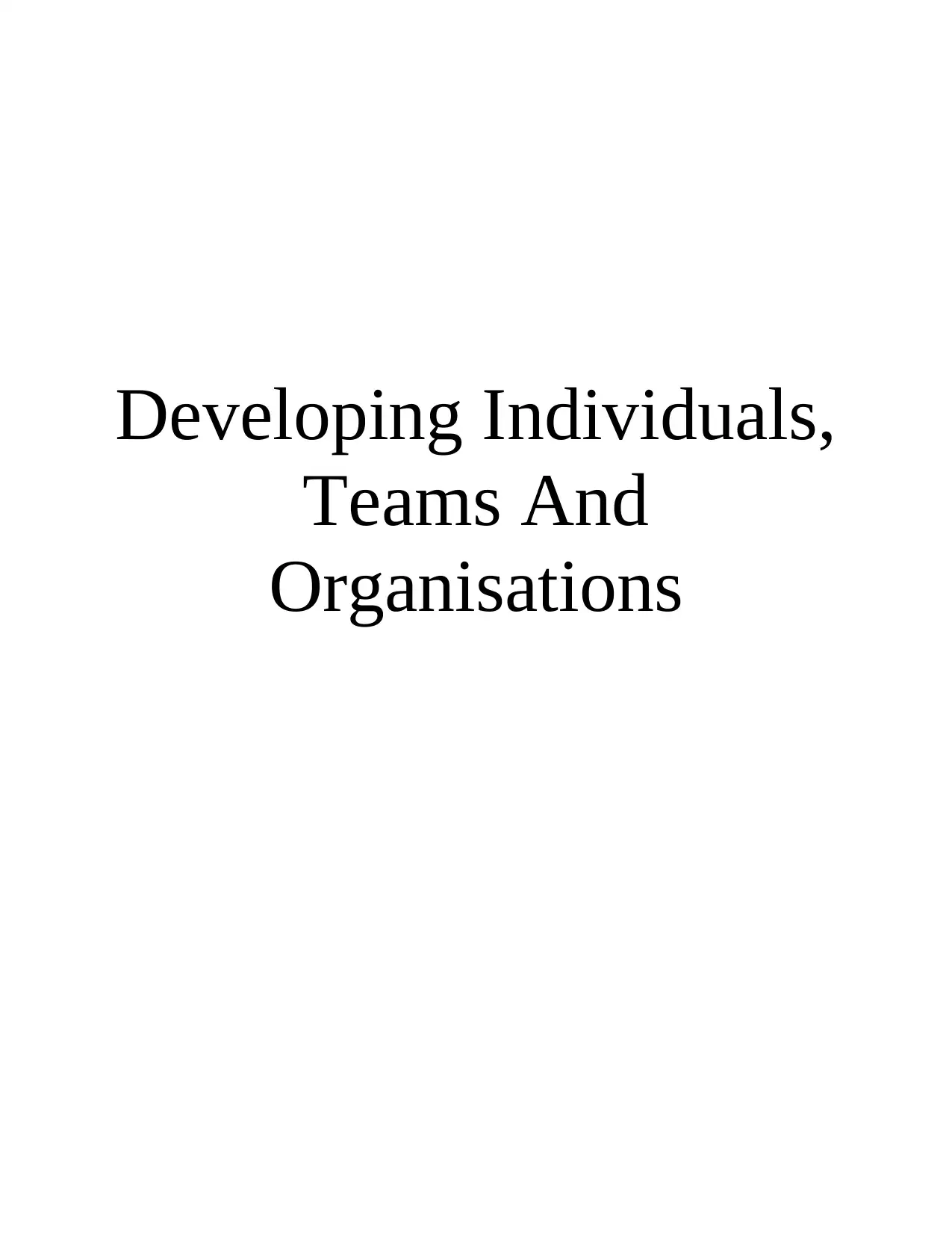
Developing Individuals,
Teams And
Organisations
Teams And
Organisations
Paraphrase This Document
Need a fresh take? Get an instant paraphrase of this document with our AI Paraphraser
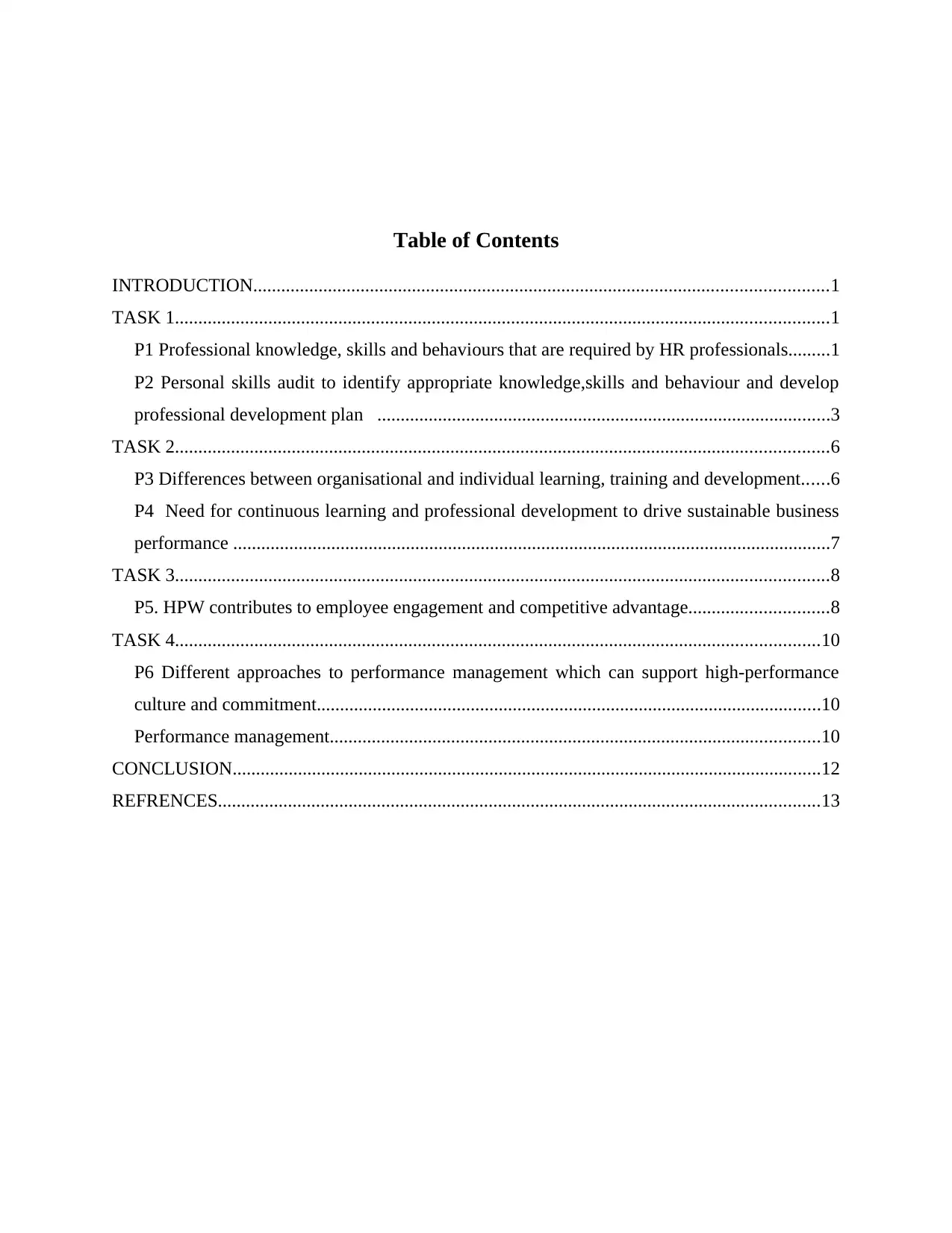
Table of Contents
INTRODUCTION...........................................................................................................................1
TASK 1............................................................................................................................................1
P1 Professional knowledge, skills and behaviours that are required by HR professionals.........1
P2 Personal skills audit to identify appropriate knowledge,skills and behaviour and develop
professional development plan .................................................................................................3
TASK 2............................................................................................................................................6
P3 Differences between organisational and individual learning, training and development......6
P4 Need for continuous learning and professional development to drive sustainable business
performance ................................................................................................................................7
TASK 3............................................................................................................................................8
P5. HPW contributes to employee engagement and competitive advantage..............................8
TASK 4..........................................................................................................................................10
P6 Different approaches to performance management which can support high-performance
culture and commitment............................................................................................................10
Performance management.........................................................................................................10
CONCLUSION..............................................................................................................................12
REFRENCES.................................................................................................................................13
INTRODUCTION...........................................................................................................................1
TASK 1............................................................................................................................................1
P1 Professional knowledge, skills and behaviours that are required by HR professionals.........1
P2 Personal skills audit to identify appropriate knowledge,skills and behaviour and develop
professional development plan .................................................................................................3
TASK 2............................................................................................................................................6
P3 Differences between organisational and individual learning, training and development......6
P4 Need for continuous learning and professional development to drive sustainable business
performance ................................................................................................................................7
TASK 3............................................................................................................................................8
P5. HPW contributes to employee engagement and competitive advantage..............................8
TASK 4..........................................................................................................................................10
P6 Different approaches to performance management which can support high-performance
culture and commitment............................................................................................................10
Performance management.........................................................................................................10
CONCLUSION..............................................................................................................................12
REFRENCES.................................................................................................................................13

⊘ This is a preview!⊘
Do you want full access?
Subscribe today to unlock all pages.

Trusted by 1+ million students worldwide
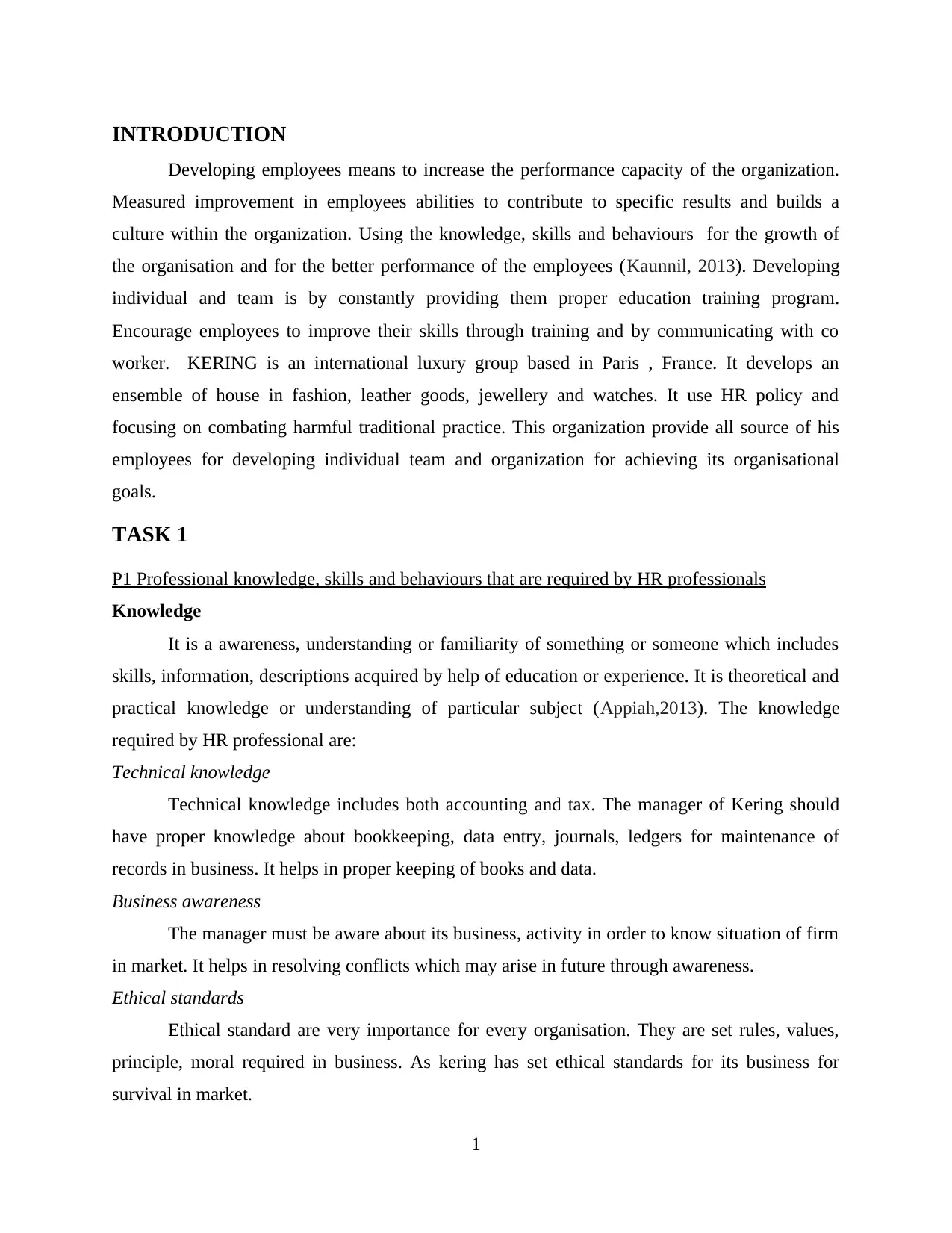
INTRODUCTION
Developing employees means to increase the performance capacity of the organization.
Measured improvement in employees abilities to contribute to specific results and builds a
culture within the organization. Using the knowledge, skills and behaviours for the growth of
the organisation and for the better performance of the employees (Kaunnil, 2013). Developing
individual and team is by constantly providing them proper education training program.
Encourage employees to improve their skills through training and by communicating with co
worker. KERING is an international luxury group based in Paris , France. It develops an
ensemble of house in fashion, leather goods, jewellery and watches. It use HR policy and
focusing on combating harmful traditional practice. This organization provide all source of his
employees for developing individual team and organization for achieving its organisational
goals.
TASK 1
P1 Professional knowledge, skills and behaviours that are required by HR professionals
Knowledge
It is a awareness, understanding or familiarity of something or someone which includes
skills, information, descriptions acquired by help of education or experience. It is theoretical and
practical knowledge or understanding of particular subject (Appiah,2013). The knowledge
required by HR professional are:
Technical knowledge
Technical knowledge includes both accounting and tax. The manager of Kering should
have proper knowledge about bookkeeping, data entry, journals, ledgers for maintenance of
records in business. It helps in proper keeping of books and data.
Business awareness
The manager must be aware about its business, activity in order to know situation of firm
in market. It helps in resolving conflicts which may arise in future through awareness.
Ethical standards
Ethical standard are very importance for every organisation. They are set rules, values,
principle, moral required in business. As kering has set ethical standards for its business for
survival in market.
1
Developing employees means to increase the performance capacity of the organization.
Measured improvement in employees abilities to contribute to specific results and builds a
culture within the organization. Using the knowledge, skills and behaviours for the growth of
the organisation and for the better performance of the employees (Kaunnil, 2013). Developing
individual and team is by constantly providing them proper education training program.
Encourage employees to improve their skills through training and by communicating with co
worker. KERING is an international luxury group based in Paris , France. It develops an
ensemble of house in fashion, leather goods, jewellery and watches. It use HR policy and
focusing on combating harmful traditional practice. This organization provide all source of his
employees for developing individual team and organization for achieving its organisational
goals.
TASK 1
P1 Professional knowledge, skills and behaviours that are required by HR professionals
Knowledge
It is a awareness, understanding or familiarity of something or someone which includes
skills, information, descriptions acquired by help of education or experience. It is theoretical and
practical knowledge or understanding of particular subject (Appiah,2013). The knowledge
required by HR professional are:
Technical knowledge
Technical knowledge includes both accounting and tax. The manager of Kering should
have proper knowledge about bookkeeping, data entry, journals, ledgers for maintenance of
records in business. It helps in proper keeping of books and data.
Business awareness
The manager must be aware about its business, activity in order to know situation of firm
in market. It helps in resolving conflicts which may arise in future through awareness.
Ethical standards
Ethical standard are very importance for every organisation. They are set rules, values,
principle, moral required in business. As kering has set ethical standards for its business for
survival in market.
1
Paraphrase This Document
Need a fresh take? Get an instant paraphrase of this document with our AI Paraphraser
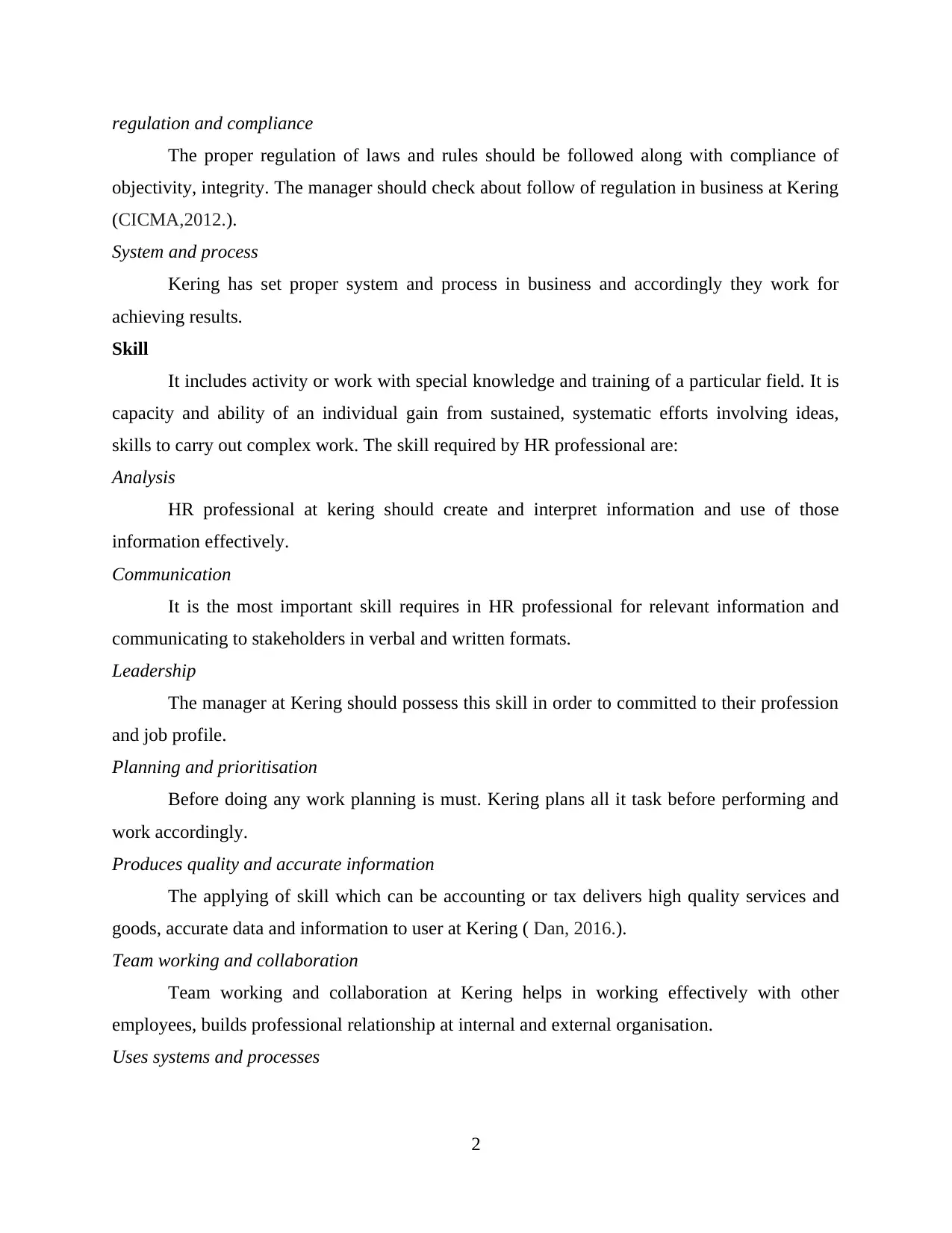
regulation and compliance
The proper regulation of laws and rules should be followed along with compliance of
objectivity, integrity. The manager should check about follow of regulation in business at Kering
(CICMA,2012.).
System and process
Kering has set proper system and process in business and accordingly they work for
achieving results.
Skill
It includes activity or work with special knowledge and training of a particular field. It is
capacity and ability of an individual gain from sustained, systematic efforts involving ideas,
skills to carry out complex work. The skill required by HR professional are:
Analysis
HR professional at kering should create and interpret information and use of those
information effectively.
Communication
It is the most important skill requires in HR professional for relevant information and
communicating to stakeholders in verbal and written formats.
Leadership
The manager at Kering should possess this skill in order to committed to their profession
and job profile.
Planning and prioritisation
Before doing any work planning is must. Kering plans all it task before performing and
work accordingly.
Produces quality and accurate information
The applying of skill which can be accounting or tax delivers high quality services and
goods, accurate data and information to user at Kering ( Dan, 2016.).
Team working and collaboration
Team working and collaboration at Kering helps in working effectively with other
employees, builds professional relationship at internal and external organisation.
Uses systems and processes
2
The proper regulation of laws and rules should be followed along with compliance of
objectivity, integrity. The manager should check about follow of regulation in business at Kering
(CICMA,2012.).
System and process
Kering has set proper system and process in business and accordingly they work for
achieving results.
Skill
It includes activity or work with special knowledge and training of a particular field. It is
capacity and ability of an individual gain from sustained, systematic efforts involving ideas,
skills to carry out complex work. The skill required by HR professional are:
Analysis
HR professional at kering should create and interpret information and use of those
information effectively.
Communication
It is the most important skill requires in HR professional for relevant information and
communicating to stakeholders in verbal and written formats.
Leadership
The manager at Kering should possess this skill in order to committed to their profession
and job profile.
Planning and prioritisation
Before doing any work planning is must. Kering plans all it task before performing and
work accordingly.
Produces quality and accurate information
The applying of skill which can be accounting or tax delivers high quality services and
goods, accurate data and information to user at Kering ( Dan, 2016.).
Team working and collaboration
Team working and collaboration at Kering helps in working effectively with other
employees, builds professional relationship at internal and external organisation.
Uses systems and processes
2
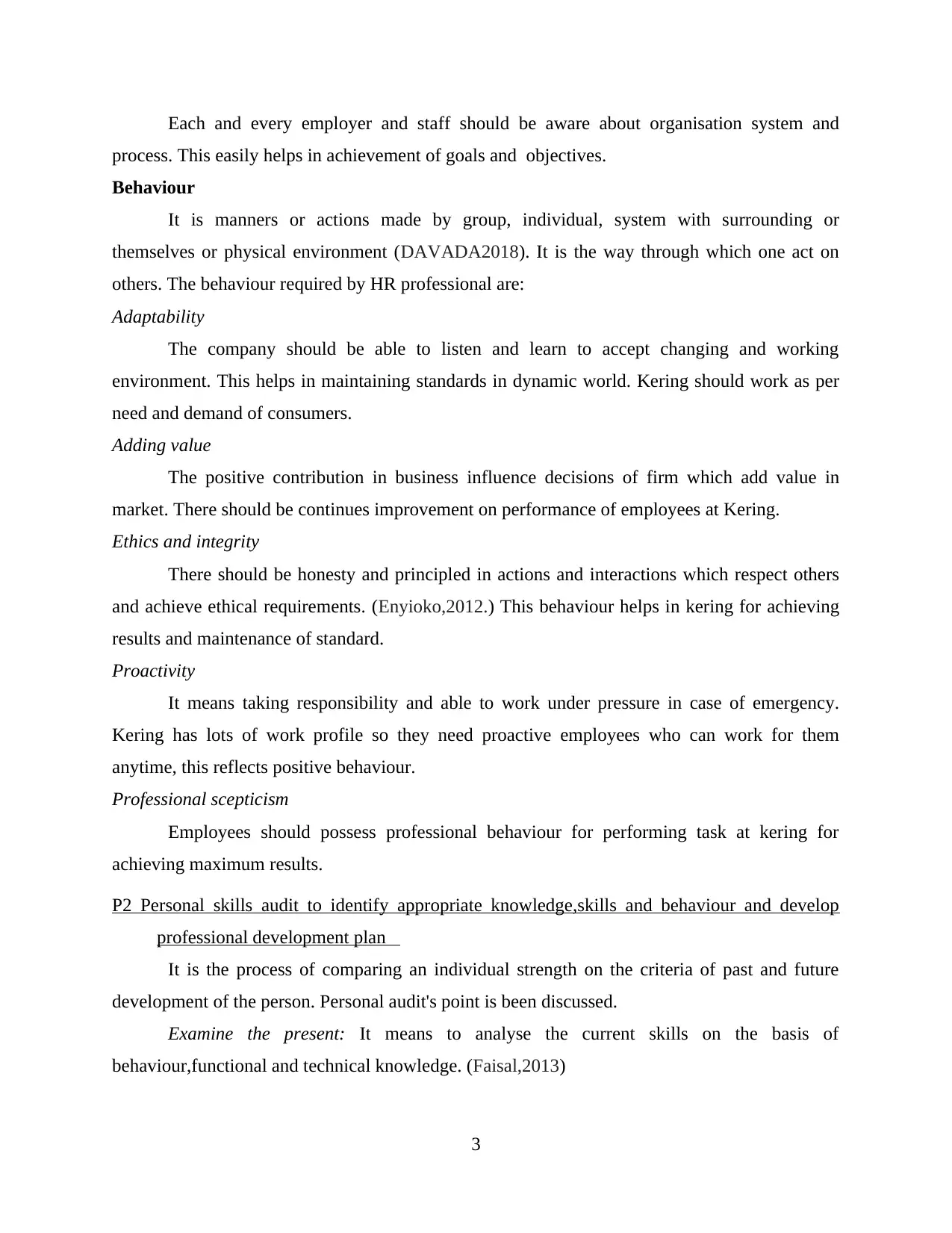
Each and every employer and staff should be aware about organisation system and
process. This easily helps in achievement of goals and objectives.
Behaviour
It is manners or actions made by group, individual, system with surrounding or
themselves or physical environment (DAVADA2018). It is the way through which one act on
others. The behaviour required by HR professional are:
Adaptability
The company should be able to listen and learn to accept changing and working
environment. This helps in maintaining standards in dynamic world. Kering should work as per
need and demand of consumers.
Adding value
The positive contribution in business influence decisions of firm which add value in
market. There should be continues improvement on performance of employees at Kering.
Ethics and integrity
There should be honesty and principled in actions and interactions which respect others
and achieve ethical requirements. (Enyioko,2012.) This behaviour helps in kering for achieving
results and maintenance of standard.
Proactivity
It means taking responsibility and able to work under pressure in case of emergency.
Kering has lots of work profile so they need proactive employees who can work for them
anytime, this reflects positive behaviour.
Professional scepticism
Employees should possess professional behaviour for performing task at kering for
achieving maximum results.
P2 Personal skills audit to identify appropriate knowledge,skills and behaviour and develop
professional development plan
It is the process of comparing an individual strength on the criteria of past and future
development of the person. Personal audit's point is been discussed.
Examine the present: It means to analyse the current skills on the basis of
behaviour,functional and technical knowledge. (Faisal,2013)
3
process. This easily helps in achievement of goals and objectives.
Behaviour
It is manners or actions made by group, individual, system with surrounding or
themselves or physical environment (DAVADA2018). It is the way through which one act on
others. The behaviour required by HR professional are:
Adaptability
The company should be able to listen and learn to accept changing and working
environment. This helps in maintaining standards in dynamic world. Kering should work as per
need and demand of consumers.
Adding value
The positive contribution in business influence decisions of firm which add value in
market. There should be continues improvement on performance of employees at Kering.
Ethics and integrity
There should be honesty and principled in actions and interactions which respect others
and achieve ethical requirements. (Enyioko,2012.) This behaviour helps in kering for achieving
results and maintenance of standard.
Proactivity
It means taking responsibility and able to work under pressure in case of emergency.
Kering has lots of work profile so they need proactive employees who can work for them
anytime, this reflects positive behaviour.
Professional scepticism
Employees should possess professional behaviour for performing task at kering for
achieving maximum results.
P2 Personal skills audit to identify appropriate knowledge,skills and behaviour and develop
professional development plan
It is the process of comparing an individual strength on the criteria of past and future
development of the person. Personal audit's point is been discussed.
Examine the present: It means to analyse the current skills on the basis of
behaviour,functional and technical knowledge. (Faisal,2013)
3
⊘ This is a preview!⊘
Do you want full access?
Subscribe today to unlock all pages.

Trusted by 1+ million students worldwide
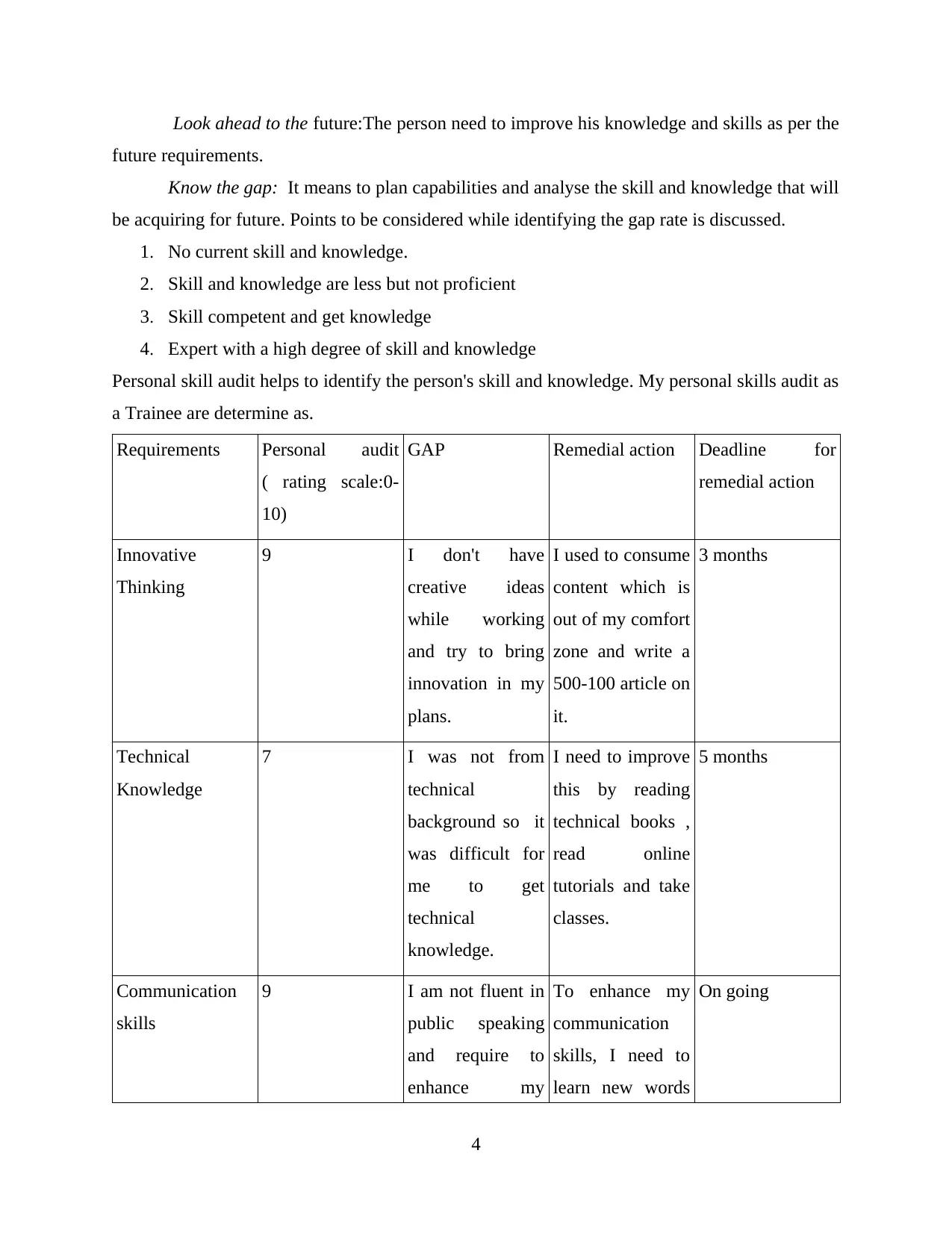
Look ahead to the future:The person need to improve his knowledge and skills as per the
future requirements.
Know the gap: It means to plan capabilities and analyse the skill and knowledge that will
be acquiring for future. Points to be considered while identifying the gap rate is discussed.
1. No current skill and knowledge.
2. Skill and knowledge are less but not proficient
3. Skill competent and get knowledge
4. Expert with a high degree of skill and knowledge
Personal skill audit helps to identify the person's skill and knowledge. My personal skills audit as
a Trainee are determine as.
Requirements Personal audit
( rating scale:0-
10)
GAP Remedial action Deadline for
remedial action
Innovative
Thinking
9 I don't have
creative ideas
while working
and try to bring
innovation in my
plans.
I used to consume
content which is
out of my comfort
zone and write a
500-100 article on
it.
3 months
Technical
Knowledge
7 I was not from
technical
background so it
was difficult for
me to get
technical
knowledge.
I need to improve
this by reading
technical books ,
read online
tutorials and take
classes.
5 months
Communication
skills
9 I am not fluent in
public speaking
and require to
enhance my
To enhance my
communication
skills, I need to
learn new words
On going
4
future requirements.
Know the gap: It means to plan capabilities and analyse the skill and knowledge that will
be acquiring for future. Points to be considered while identifying the gap rate is discussed.
1. No current skill and knowledge.
2. Skill and knowledge are less but not proficient
3. Skill competent and get knowledge
4. Expert with a high degree of skill and knowledge
Personal skill audit helps to identify the person's skill and knowledge. My personal skills audit as
a Trainee are determine as.
Requirements Personal audit
( rating scale:0-
10)
GAP Remedial action Deadline for
remedial action
Innovative
Thinking
9 I don't have
creative ideas
while working
and try to bring
innovation in my
plans.
I used to consume
content which is
out of my comfort
zone and write a
500-100 article on
it.
3 months
Technical
Knowledge
7 I was not from
technical
background so it
was difficult for
me to get
technical
knowledge.
I need to improve
this by reading
technical books ,
read online
tutorials and take
classes.
5 months
Communication
skills
9 I am not fluent in
public speaking
and require to
enhance my
To enhance my
communication
skills, I need to
learn new words
On going
4
Paraphrase This Document
Need a fresh take? Get an instant paraphrase of this document with our AI Paraphraser
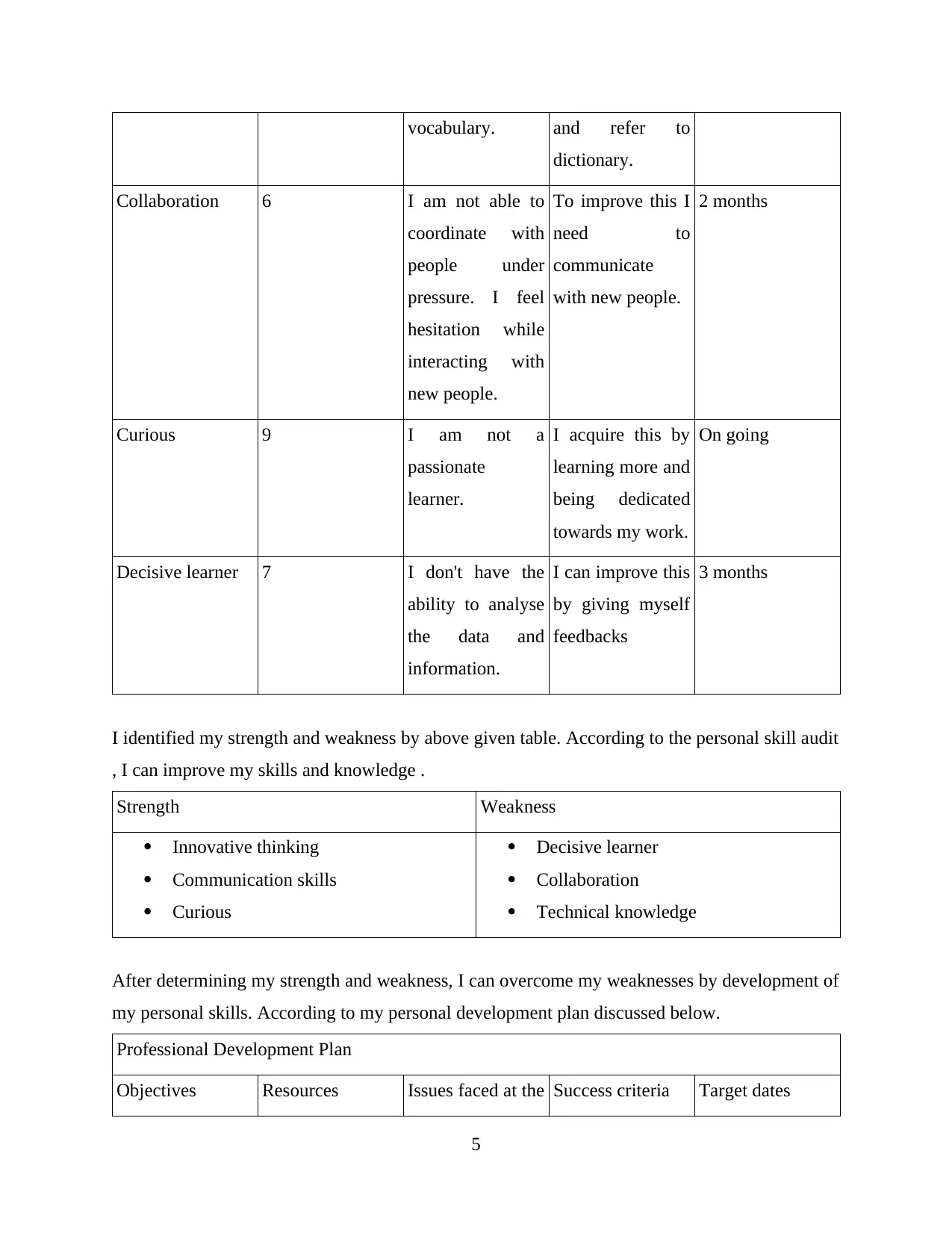
vocabulary. and refer to
dictionary.
Collaboration 6 I am not able to
coordinate with
people under
pressure. I feel
hesitation while
interacting with
new people.
To improve this I
need to
communicate
with new people.
2 months
Curious 9 I am not a
passionate
learner.
I acquire this by
learning more and
being dedicated
towards my work.
On going
Decisive learner 7 I don't have the
ability to analyse
the data and
information.
I can improve this
by giving myself
feedbacks
3 months
I identified my strength and weakness by above given table. According to the personal skill audit
, I can improve my skills and knowledge .
Strength Weakness
Innovative thinking
Communication skills
Curious
Decisive learner
Collaboration
Technical knowledge
After determining my strength and weakness, I can overcome my weaknesses by development of
my personal skills. According to my personal development plan discussed below.
Professional Development Plan
Objectives Resources Issues faced at the Success criteria Target dates
5
dictionary.
Collaboration 6 I am not able to
coordinate with
people under
pressure. I feel
hesitation while
interacting with
new people.
To improve this I
need to
communicate
with new people.
2 months
Curious 9 I am not a
passionate
learner.
I acquire this by
learning more and
being dedicated
towards my work.
On going
Decisive learner 7 I don't have the
ability to analyse
the data and
information.
I can improve this
by giving myself
feedbacks
3 months
I identified my strength and weakness by above given table. According to the personal skill audit
, I can improve my skills and knowledge .
Strength Weakness
Innovative thinking
Communication skills
Curious
Decisive learner
Collaboration
Technical knowledge
After determining my strength and weakness, I can overcome my weaknesses by development of
my personal skills. According to my personal development plan discussed below.
Professional Development Plan
Objectives Resources Issues faced at the Success criteria Target dates
5
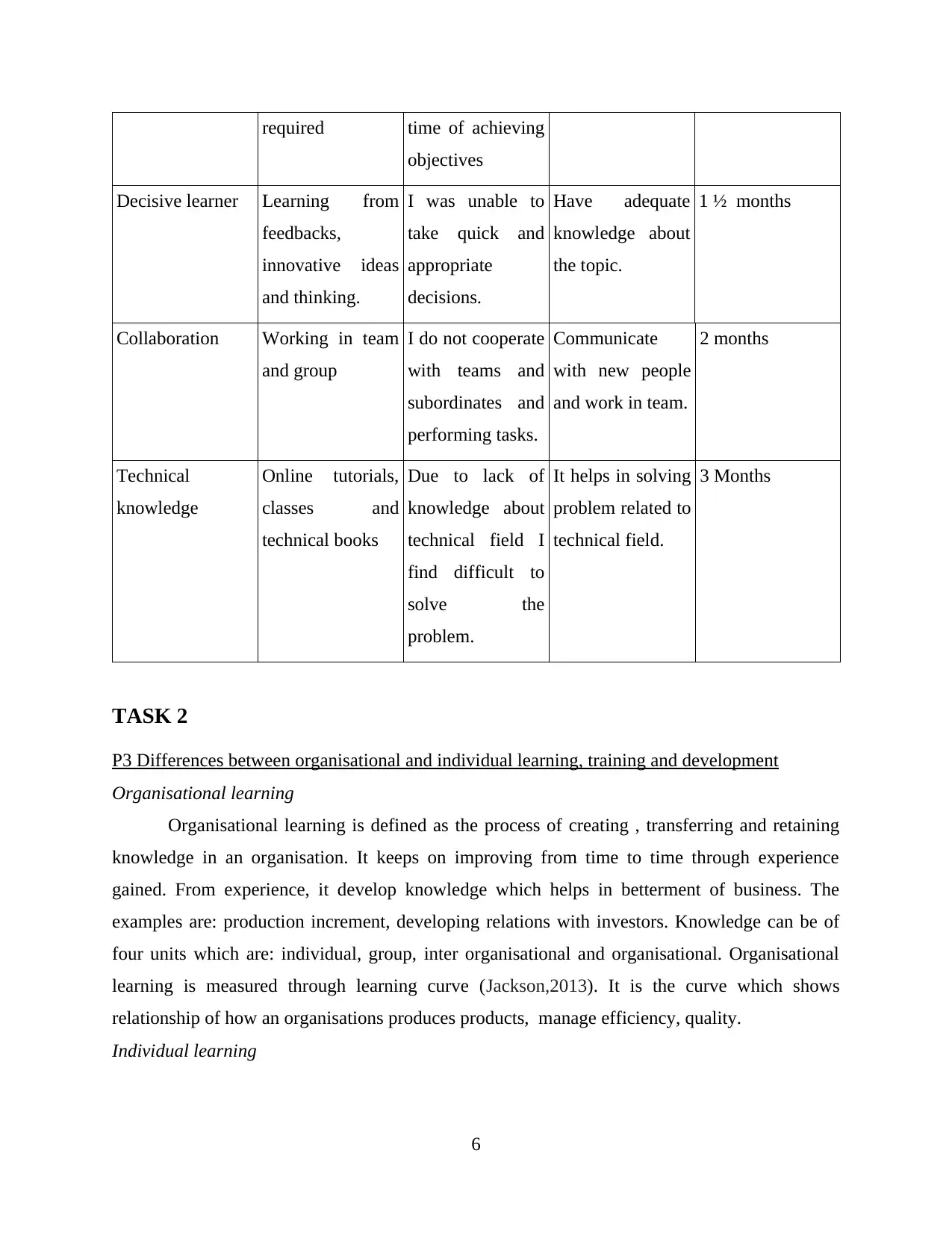
required time of achieving
objectives
Decisive learner Learning from
feedbacks,
innovative ideas
and thinking.
I was unable to
take quick and
appropriate
decisions.
Have adequate
knowledge about
the topic.
1 ½ months
Collaboration Working in team
and group
I do not cooperate
with teams and
subordinates and
performing tasks.
Communicate
with new people
and work in team.
2 months
Technical
knowledge
Online tutorials,
classes and
technical books
Due to lack of
knowledge about
technical field I
find difficult to
solve the
problem.
It helps in solving
problem related to
technical field.
3 Months
TASK 2
P3 Differences between organisational and individual learning, training and development
Organisational learning
Organisational learning is defined as the process of creating , transferring and retaining
knowledge in an organisation. It keeps on improving from time to time through experience
gained. From experience, it develop knowledge which helps in betterment of business. The
examples are: production increment, developing relations with investors. Knowledge can be of
four units which are: individual, group, inter organisational and organisational. Organisational
learning is measured through learning curve (Jackson,2013). It is the curve which shows
relationship of how an organisations produces products, manage efficiency, quality.
Individual learning
6
objectives
Decisive learner Learning from
feedbacks,
innovative ideas
and thinking.
I was unable to
take quick and
appropriate
decisions.
Have adequate
knowledge about
the topic.
1 ½ months
Collaboration Working in team
and group
I do not cooperate
with teams and
subordinates and
performing tasks.
Communicate
with new people
and work in team.
2 months
Technical
knowledge
Online tutorials,
classes and
technical books
Due to lack of
knowledge about
technical field I
find difficult to
solve the
problem.
It helps in solving
problem related to
technical field.
3 Months
TASK 2
P3 Differences between organisational and individual learning, training and development
Organisational learning
Organisational learning is defined as the process of creating , transferring and retaining
knowledge in an organisation. It keeps on improving from time to time through experience
gained. From experience, it develop knowledge which helps in betterment of business. The
examples are: production increment, developing relations with investors. Knowledge can be of
four units which are: individual, group, inter organisational and organisational. Organisational
learning is measured through learning curve (Jackson,2013). It is the curve which shows
relationship of how an organisations produces products, manage efficiency, quality.
Individual learning
6
⊘ This is a preview!⊘
Do you want full access?
Subscribe today to unlock all pages.

Trusted by 1+ million students worldwide
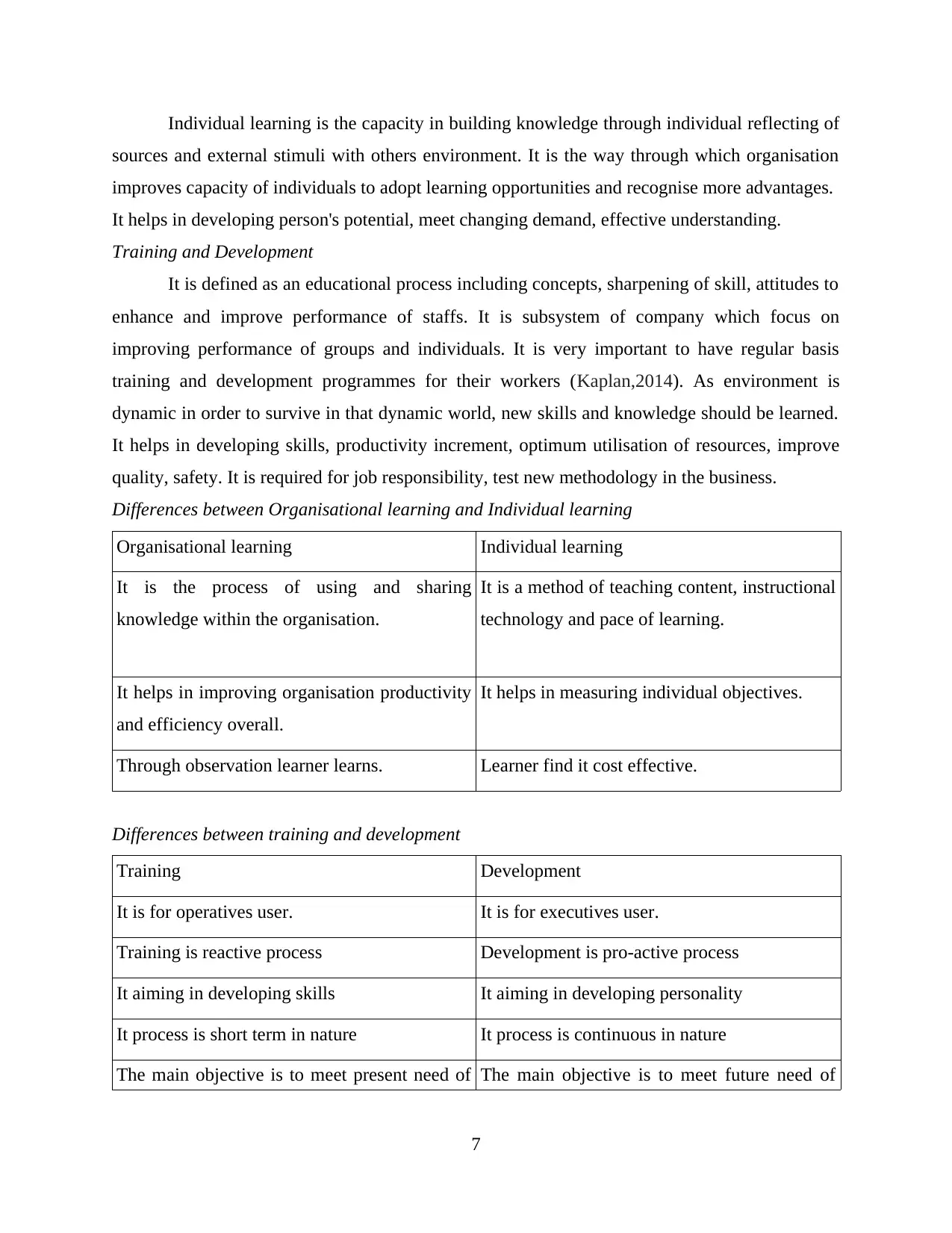
Individual learning is the capacity in building knowledge through individual reflecting of
sources and external stimuli with others environment. It is the way through which organisation
improves capacity of individuals to adopt learning opportunities and recognise more advantages.
It helps in developing person's potential, meet changing demand, effective understanding.
Training and Development
It is defined as an educational process including concepts, sharpening of skill, attitudes to
enhance and improve performance of staffs. It is subsystem of company which focus on
improving performance of groups and individuals. It is very important to have regular basis
training and development programmes for their workers (Kaplan,2014). As environment is
dynamic in order to survive in that dynamic world, new skills and knowledge should be learned.
It helps in developing skills, productivity increment, optimum utilisation of resources, improve
quality, safety. It is required for job responsibility, test new methodology in the business.
Differences between Organisational learning and Individual learning
Organisational learning Individual learning
It is the process of using and sharing
knowledge within the organisation.
It is a method of teaching content, instructional
technology and pace of learning.
It helps in improving organisation productivity
and efficiency overall.
It helps in measuring individual objectives.
Through observation learner learns. Learner find it cost effective.
Differences between training and development
Training Development
It is for operatives user. It is for executives user.
Training is reactive process Development is pro-active process
It aiming in developing skills It aiming in developing personality
It process is short term in nature It process is continuous in nature
The main objective is to meet present need of The main objective is to meet future need of
7
sources and external stimuli with others environment. It is the way through which organisation
improves capacity of individuals to adopt learning opportunities and recognise more advantages.
It helps in developing person's potential, meet changing demand, effective understanding.
Training and Development
It is defined as an educational process including concepts, sharpening of skill, attitudes to
enhance and improve performance of staffs. It is subsystem of company which focus on
improving performance of groups and individuals. It is very important to have regular basis
training and development programmes for their workers (Kaplan,2014). As environment is
dynamic in order to survive in that dynamic world, new skills and knowledge should be learned.
It helps in developing skills, productivity increment, optimum utilisation of resources, improve
quality, safety. It is required for job responsibility, test new methodology in the business.
Differences between Organisational learning and Individual learning
Organisational learning Individual learning
It is the process of using and sharing
knowledge within the organisation.
It is a method of teaching content, instructional
technology and pace of learning.
It helps in improving organisation productivity
and efficiency overall.
It helps in measuring individual objectives.
Through observation learner learns. Learner find it cost effective.
Differences between training and development
Training Development
It is for operatives user. It is for executives user.
Training is reactive process Development is pro-active process
It aiming in developing skills It aiming in developing personality
It process is short term in nature It process is continuous in nature
The main objective is to meet present need of The main objective is to meet future need of
7
Paraphrase This Document
Need a fresh take? Get an instant paraphrase of this document with our AI Paraphraser
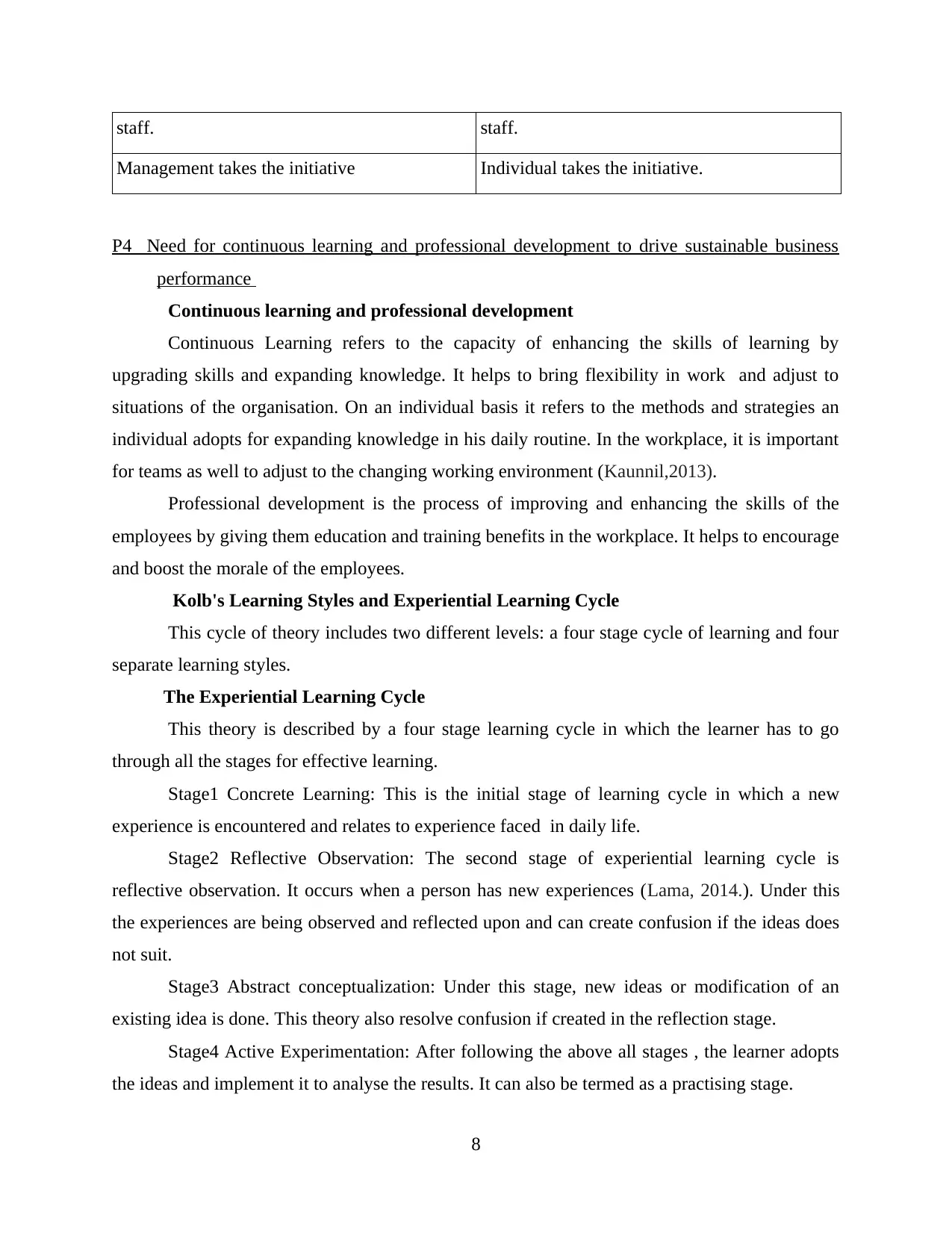
staff. staff.
Management takes the initiative Individual takes the initiative.
P4 Need for continuous learning and professional development to drive sustainable business
performance
Continuous learning and professional development
Continuous Learning refers to the capacity of enhancing the skills of learning by
upgrading skills and expanding knowledge. It helps to bring flexibility in work and adjust to
situations of the organisation. On an individual basis it refers to the methods and strategies an
individual adopts for expanding knowledge in his daily routine. In the workplace, it is important
for teams as well to adjust to the changing working environment (Kaunnil,2013).
Professional development is the process of improving and enhancing the skills of the
employees by giving them education and training benefits in the workplace. It helps to encourage
and boost the morale of the employees.
Kolb's Learning Styles and Experiential Learning Cycle
This cycle of theory includes two different levels: a four stage cycle of learning and four
separate learning styles.
The Experiential Learning Cycle
This theory is described by a four stage learning cycle in which the learner has to go
through all the stages for effective learning.
Stage1 Concrete Learning: This is the initial stage of learning cycle in which a new
experience is encountered and relates to experience faced in daily life.
Stage2 Reflective Observation: The second stage of experiential learning cycle is
reflective observation. It occurs when a person has new experiences (Lama, 2014.). Under this
the experiences are being observed and reflected upon and can create confusion if the ideas does
not suit.
Stage3 Abstract conceptualization: Under this stage, new ideas or modification of an
existing idea is done. This theory also resolve confusion if created in the reflection stage.
Stage4 Active Experimentation: After following the above all stages , the learner adopts
the ideas and implement it to analyse the results. It can also be termed as a practising stage.
8
Management takes the initiative Individual takes the initiative.
P4 Need for continuous learning and professional development to drive sustainable business
performance
Continuous learning and professional development
Continuous Learning refers to the capacity of enhancing the skills of learning by
upgrading skills and expanding knowledge. It helps to bring flexibility in work and adjust to
situations of the organisation. On an individual basis it refers to the methods and strategies an
individual adopts for expanding knowledge in his daily routine. In the workplace, it is important
for teams as well to adjust to the changing working environment (Kaunnil,2013).
Professional development is the process of improving and enhancing the skills of the
employees by giving them education and training benefits in the workplace. It helps to encourage
and boost the morale of the employees.
Kolb's Learning Styles and Experiential Learning Cycle
This cycle of theory includes two different levels: a four stage cycle of learning and four
separate learning styles.
The Experiential Learning Cycle
This theory is described by a four stage learning cycle in which the learner has to go
through all the stages for effective learning.
Stage1 Concrete Learning: This is the initial stage of learning cycle in which a new
experience is encountered and relates to experience faced in daily life.
Stage2 Reflective Observation: The second stage of experiential learning cycle is
reflective observation. It occurs when a person has new experiences (Lama, 2014.). Under this
the experiences are being observed and reflected upon and can create confusion if the ideas does
not suit.
Stage3 Abstract conceptualization: Under this stage, new ideas or modification of an
existing idea is done. This theory also resolve confusion if created in the reflection stage.
Stage4 Active Experimentation: After following the above all stages , the learner adopts
the ideas and implement it to analyse the results. It can also be termed as a practising stage.
8
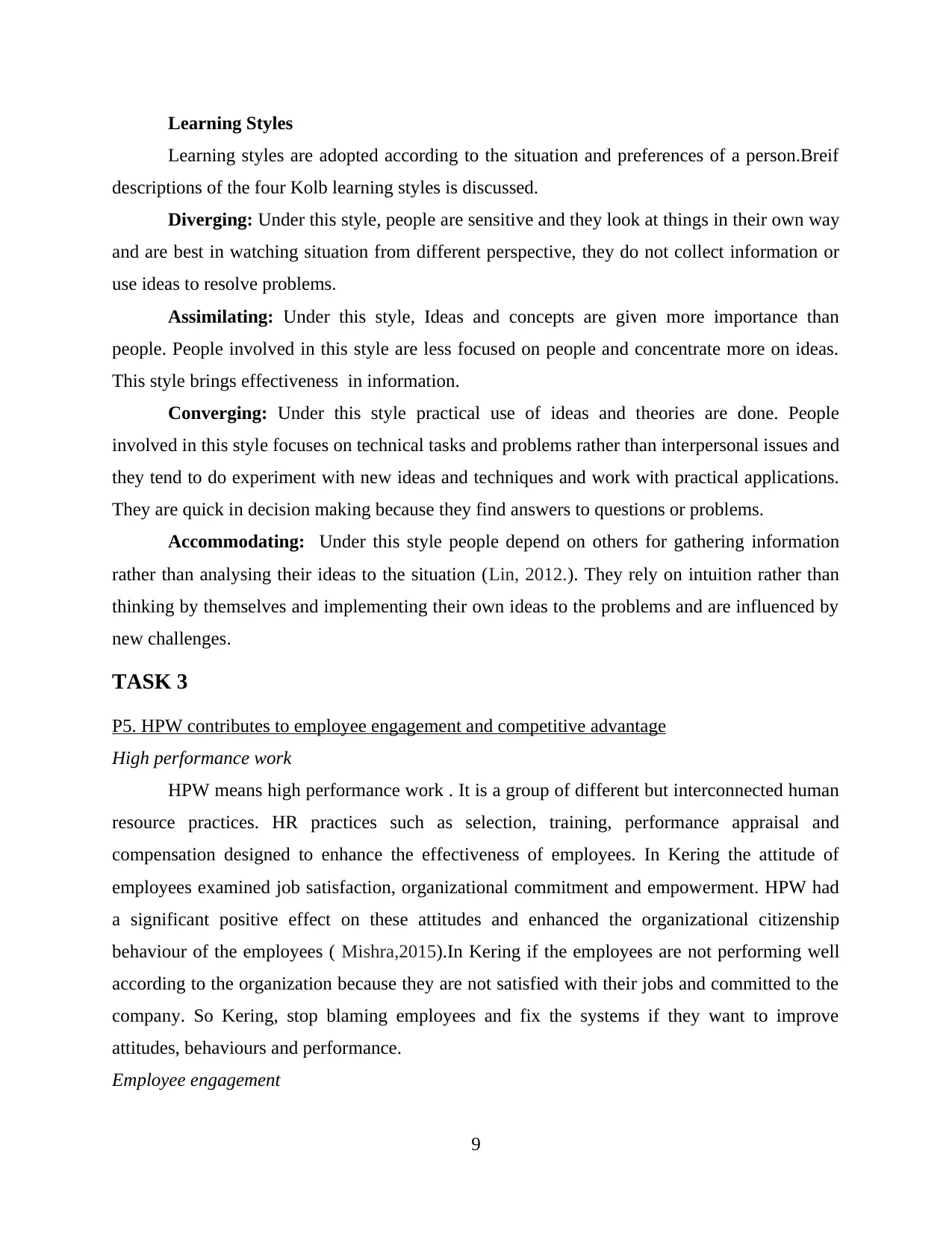
Learning Styles
Learning styles are adopted according to the situation and preferences of a person.Breif
descriptions of the four Kolb learning styles is discussed.
Diverging: Under this style, people are sensitive and they look at things in their own way
and are best in watching situation from different perspective, they do not collect information or
use ideas to resolve problems.
Assimilating: Under this style, Ideas and concepts are given more importance than
people. People involved in this style are less focused on people and concentrate more on ideas.
This style brings effectiveness in information.
Converging: Under this style practical use of ideas and theories are done. People
involved in this style focuses on technical tasks and problems rather than interpersonal issues and
they tend to do experiment with new ideas and techniques and work with practical applications.
They are quick in decision making because they find answers to questions or problems.
Accommodating: Under this style people depend on others for gathering information
rather than analysing their ideas to the situation (Lin, 2012.). They rely on intuition rather than
thinking by themselves and implementing their own ideas to the problems and are influenced by
new challenges.
TASK 3
P5. HPW contributes to employee engagement and competitive advantage
High performance work
HPW means high performance work . It is a group of different but interconnected human
resource practices. HR practices such as selection, training, performance appraisal and
compensation designed to enhance the effectiveness of employees. In Kering the attitude of
employees examined job satisfaction, organizational commitment and empowerment. HPW had
a significant positive effect on these attitudes and enhanced the organizational citizenship
behaviour of the employees ( Mishra,2015).In Kering if the employees are not performing well
according to the organization because they are not satisfied with their jobs and committed to the
company. So Kering, stop blaming employees and fix the systems if they want to improve
attitudes, behaviours and performance.
Employee engagement
9
Learning styles are adopted according to the situation and preferences of a person.Breif
descriptions of the four Kolb learning styles is discussed.
Diverging: Under this style, people are sensitive and they look at things in their own way
and are best in watching situation from different perspective, they do not collect information or
use ideas to resolve problems.
Assimilating: Under this style, Ideas and concepts are given more importance than
people. People involved in this style are less focused on people and concentrate more on ideas.
This style brings effectiveness in information.
Converging: Under this style practical use of ideas and theories are done. People
involved in this style focuses on technical tasks and problems rather than interpersonal issues and
they tend to do experiment with new ideas and techniques and work with practical applications.
They are quick in decision making because they find answers to questions or problems.
Accommodating: Under this style people depend on others for gathering information
rather than analysing their ideas to the situation (Lin, 2012.). They rely on intuition rather than
thinking by themselves and implementing their own ideas to the problems and are influenced by
new challenges.
TASK 3
P5. HPW contributes to employee engagement and competitive advantage
High performance work
HPW means high performance work . It is a group of different but interconnected human
resource practices. HR practices such as selection, training, performance appraisal and
compensation designed to enhance the effectiveness of employees. In Kering the attitude of
employees examined job satisfaction, organizational commitment and empowerment. HPW had
a significant positive effect on these attitudes and enhanced the organizational citizenship
behaviour of the employees ( Mishra,2015).In Kering if the employees are not performing well
according to the organization because they are not satisfied with their jobs and committed to the
company. So Kering, stop blaming employees and fix the systems if they want to improve
attitudes, behaviours and performance.
Employee engagement
9
⊘ This is a preview!⊘
Do you want full access?
Subscribe today to unlock all pages.

Trusted by 1+ million students worldwide
1 out of 18
Related Documents
Your All-in-One AI-Powered Toolkit for Academic Success.
+13062052269
info@desklib.com
Available 24*7 on WhatsApp / Email
![[object Object]](/_next/static/media/star-bottom.7253800d.svg)
Unlock your academic potential
Copyright © 2020–2026 A2Z Services. All Rights Reserved. Developed and managed by ZUCOL.





